Digital Poster
MSK: Dynamic & Nerve Imaging
ISMRM & ISMRT Annual Meeting & Exhibition • 10-15 May 2025 • Honolulu, Hawai'i

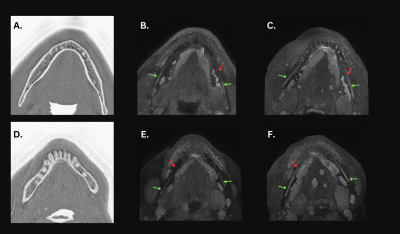 |
Computer Number: 97
2962. Visualization
of the Lingual Nerve with MENSA
T. Catargiu, O. Pinna, A-B Solana Sanchez, S. Mandava, M.
Lebel, F. Wiesinger, M. Fung, T. Wood, S. Williams
King's College London, London, United Kingdom
Impact: Enhanced visualization of the lingual nerve will
assist with diagnosis of damage and guide safer planning of
maxillofacial surgery, reducing the risk of further damage.
|
|
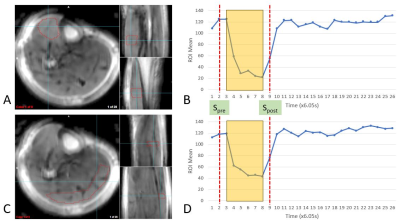 |
Computer Number: 98
2963. Dynamic
Perfusion Imaging of Dorsiflexion Exercise on Calf Muscles using
a UTE-Based DW-SSFP Sequence
K-J Jung
University of Illinois Urbana-Champaign, Urbana, United States
Impact: The DW-SSFP sequence can detect the dynamic
perfusion in 3-dimensions with a high sensitivity and fast
temporal resolution. This sequence will be best for dynamic
perfusion study compared to other methods such as ASL, BOLD,
and EPI diffusion.
|
|
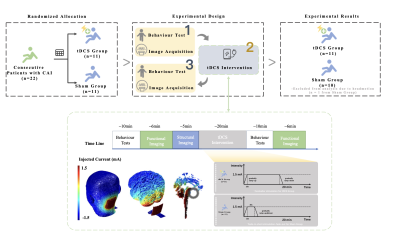 |
Computer Number: 99
2964. Effect
of Cerebellar tDCS on Postural Control and Neuroplastic Changes
in Chronic Ankle Instability
R. Lu, X. Xue, S. Zheng, Y. Zhang, T. Xia, T. Hwang, Y-H
Chu, Q. Li, W. Tang, Y. Hua, H. Wang
Huashan Hospital, Fudan University, Shanghai, China
Impact: This preliminary study marks the first
application of cerebellar tDCS in the rehabilitation of CAI
and musculoskeletal injuries.
|
|
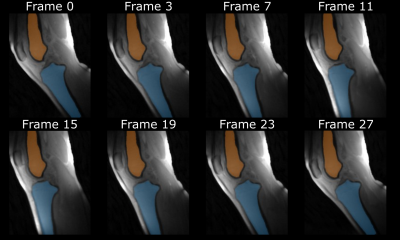 |
Computer Number: 100
2965. Semi-Automated
Bone Tracking for Dynamic MRI Analysis of Knee Joint Kinematics
A. Nepal, N. Brisson, G. Duda, F. Güttler, J. Reichenbach,
M. Krämer
Jena University Hospital - Friedrich Schiller University Jena, Jena, Germany
Impact: Direct analysis of dynamic MRI frames can
achieve accurate motion tracking of the tibia and femur
without requiring high-resolution reference scans. This
approach outperforms manual segmentation and streamlines the
study of in vivo knee kinematics from imaging data.
|
|
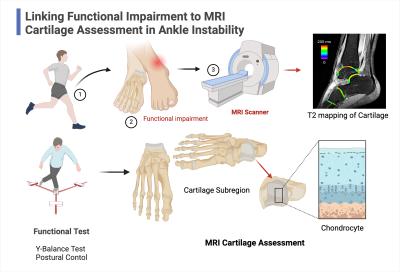 |
Computer Number: 101
2966. Correlation
between functional impairment and quantitative MRI assessment of
ankle cartilage in chronic ankle instability.
R. Lu, Z. Liu, S. Zheng, X. Xue, Y-H Chu, Y. Zhang, T. Xia,
Y. Chen, Z. Wang, Z. Wang, S. Shi, T. Hwang, Y. Song, W.
Tang, S. Chen, Y. Hua, H. Wang
Huashan Hospital, Fudan University, Shanghai, China
Impact: This study links CAI to functional impairments
and cartilage degeneration, aiding targeted interventions to
reduce long-term joint damage.
|
|
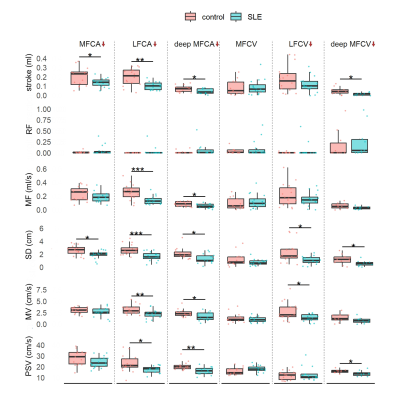 |
Computer Number: 102
2967. Quantification
of Femoral Head Perfusion using High-Resolution Phase-Contrast
quantitative flow
Z. Liao, J. Sun, X. Zhang
West China Hospital, Sichuan University, Chengdu, Sichuan, China, China
Impact: This method is clinically applicable for
assessing femoral blood supply
|
|
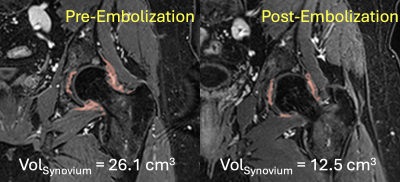 |
Computer Number: 103
2968. DCE-MRI
Guided Embolization of the Hip: Initial Experience and MR
Biomarkers of Treatment Response
E. Bultman, S. Kishore
Stanford University, Palo Alto, United States
Impact: Chronic hip pain commonly results from
osteoarthritis and has few available treatments with
demonstrated efficacy. Embolization is a novel therapy for
chronic hip pain that has the potential to improve
quality-of-life and delay/prevent end-stage arthritis
treatments such as total-hip arthroplasty.
|
|
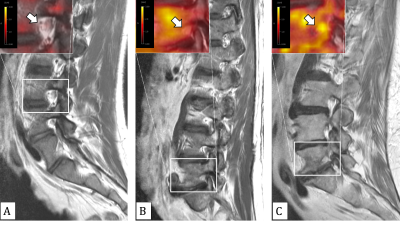 |
Computer Number: 104
2969. Foraminal
[18F]FDG uptake on PET/MRI is associated with radicular symptoms
and pain reduction after image-guided nerve root block
V. Kreutzinger, K. Ziegeler, M. Han, C. Chin, C. Fitch, E.
Bahroos, T. Link, S. Majumdar, D. Yoon
University of San Francisco, San Francisco, United States
Impact: Foraminal [18F]FDG uptake on PET/MRI as a
surrogate marker of nerve irritation may improve the
identification of pain generators on lumbar spine imaging in
patients with radiating low back pain.
|
|
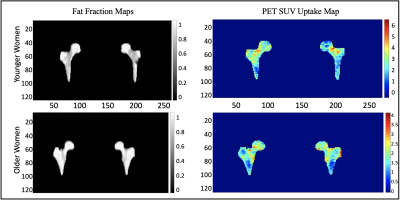 |
Computer Number: 105
2970. Comparison
of Femoral Neck PET Uptake and MRI Fat Fraction in a Healthy
Aging Female Population
E. Rubin, E. Noel, G. Gold, F. Kogan, A. Goyal
Stanford University, Stanford, United States
Impact: [18F]NaF PET/MRI provides a promising multimodal
approach to assess bone health, enabling precise monitoring
of osteoporosis progression and treatment effects. By
revealing insights into bone marrow composition and
metabolic activity, this technique may enhance understanding
of age-related bone changes.
|
|
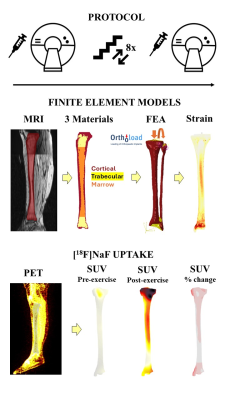 |
Computer Number: 106
2971. Spatial
correspondence between [18F]NaF PET uptake and bone strain in
the tibia
O. Bruce, A. Goyal, A. Gatti, F. Kogan
Stanford University, Stanford, United States
Impact: [18F]NaF
PET in combination with finite element analysis is a
promising approach that can be used to improve our
understanding of relationships between bone metabolism and
loading, and of the pathophysiology of bone conditions.
|
|
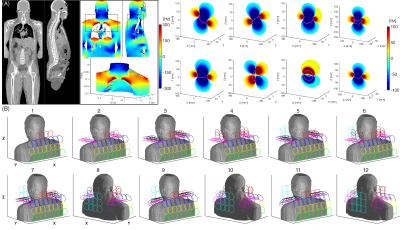 |
Computer Number: 107
2972. Design
of Shim Coil Arrays for Improving B0 Homogeneity in Brachial
Plexus MRI at 3T
Y. Shang, Z. Long, A. Malagi, L. Wang, M. Binesh, G. Diwan,
X. Zhu, J. Zepeda, F. Serry, N. Binesh, H-J Yang, H. Han
Department of Radiology, Weill Medical College of Cornell University, New York, United States
Impact: B0-simulation-guided
shim coil array design provides an efficient and economical
way to derive optimized coil geometry that is applicable to
patients with various body sizes and shapes, leading to a
substantial reduction of B0 inhomogeneity
for brachial plexus imaging.
|
|
 |
Computer Number: 108
2973. Sonic
DLTM Enhanced 3D Double-Echo Steady-State Sequence for Improved
Imaging Resolution in Magnetic Resonance Neurography
Y. Wen, D. B. Sneag, S. Queler, M. Fung, X. Zhu, E. T. Tan
GE HealthCare, Waukesha, United States
Impact:
The higher acceleration factors enabled by Sonic DLTM can be utilized to achieve higher spatial resolution in MENSA NERVE, leading to better nerve morphology depiction. |
|
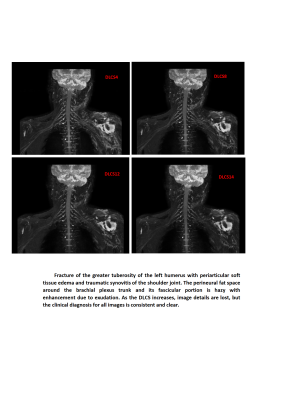 |
Computer Number: 109
2974. Compressed
Sensing Artificial Intelligence for 3D MR neurography of the
brachial
Z. Zhenyang, P. Sun
Union Hospital, Wuhan, China
Impact:
CSAI can significantly reduce the imaging time of 3D MRN while ensuring image quality, which can improve the scanning experience of patients. Additionnal impact:The latest CSAI technique might promote more extensive clinical use of 3D MRN. |
|
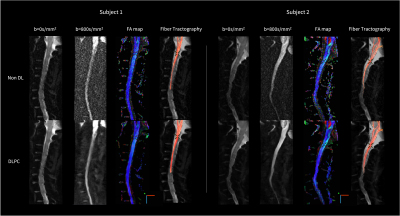 |
Computer Number: 110
2975. Improved
Brachial Plexus and C-Spine DTI using Deep Learning-based Phase
Correction
P. Lan, X. Wang, A. Guidon
GE HealthCare, Menlo Park, United States
Impact: When combined with MR neurography, DTI of the
brachial plexus and c-spine with reduced noise and increased
sharpness can help radiologists with differential diagnosis
of pathologies resulting from nerve damage.
|
|
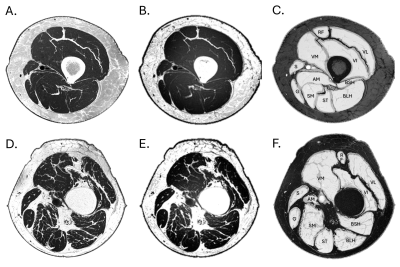 |
Computer Number: 111
2976. Texture
analysis of high-resolution MRI to assess muscle denervation in
polyneuropathy
H. Sawan, A. Chowdhury, V. Truong, N. Tsiang, M. Ramadan, S.
Y. Xuan, J. Li, Y. Chen
Wayne State University School of Medicine, Detroit, United States
Impact: This
study demonstrates a radiomics method for high-resolution
leg muscle MRI, as well as the sensitivity of texture
features to radiological and clinical severity. These
texture features may be used as monitoring biomarker for
disease progression in patients with polyneuropathy.
|
The International Society for Magnetic Resonance in Medicine is accredited by the Accreditation Council for Continuing Medical Education to provide continuing medical education for physicians.